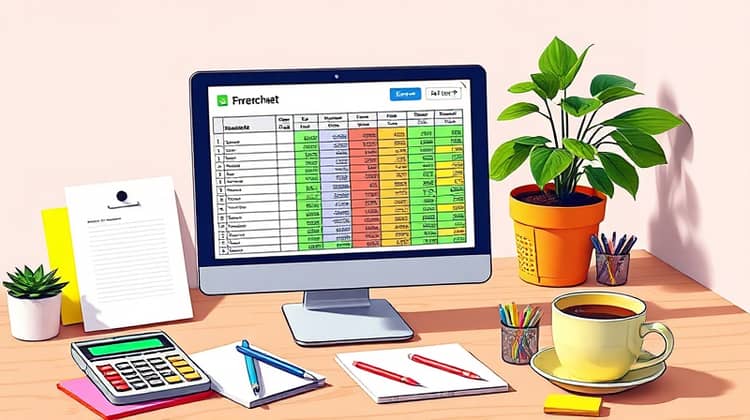Expense Tracking: 5 Proven Strategies to Cut Your Spending

In today's fast-paced world, managing your finances is more important than ever. With the rise in living costs and unforeseen expenses, having a clear picture of your spending habits can help you regain control of your finances. This article explores five proven strategies that can assist you in effectively tracking your expenses and ultimately cutting down on unnecessary spending.
Understanding your expenses is the first step in building a solid financial plan. By being aware of where your money goes, you can make informed choices that align with your financial goals. Let's dive into the five methods that will enable you to take charge of your spending.
1. Use a Dedicated App

One of the easiest ways to keep tabs on your spending is to leverage technology. There are numerous expense-tracking apps designed to simplify the process of monitoring your finances. These apps often allow users to input transactions in real-time, set budgets, and track spending habits over time.
- Easy input and tracking of expenses
- Customizable budgets
- Visual spending reports
- Sync with bank accounts
- Reminders for bill payments
By utilizing a dedicated app, you can access your spending patterns at a glance, allowing you to identify where you can cut back or need to allocate more funds. This modern approach can significantly ease the often overwhelming task of expense tracking.
2. Create a Budget Spreadsheet

If you prefer a more hands-on approach, creating a budget spreadsheet may be your best option. It allows for customization according to your financial goals and helps you visualize your income versus expenses. A budget spreadsheet can be created using software like Excel or Google Sheets, or you can utilize a financial template available online for convenience.
Budget spreadsheets also encourage discipline as you actively engage in recording your spending. Moreover, it provides you with a clear framework to follow, promoting a structured financial lifestyle.
- Start by listing all sources of income
- Categorize your expenses (fixed and variable)
- Set spending limits for each category
- Regularly update the spreadsheet with real expenses
- Analyze variances against your budget
Having all your financial data in one place not only aids in tracking your expenses but also helps you plan more effectively for the future. Regularly updating and reviewing your spreadsheet can provide insights to better manage your spending habits.
3. Categorize Your Expenses

A critical component of effective expense tracking is categorization. By organizing your spending into categories, you develop a clearer understanding of where your money is going each month. This can empower you to make smarter financial decisions and prioritize your spending.
- Housing and utilities
- Food and groceries
- Transportation costs
- Entertainment and leisure
- Health and insurance
When you categorize your expenses, it can reveal areas where you might be overspending, helping you determine the categories where cuts could be made. This strategic approach is key to improving your overall financial health.
4. Review and Analyze Regularly

Expense tracking is not a one-time task; it requires ongoing diligence. Setting aside time to review and analyze your expenses regularly is essential to maintaining a clear financial picture. You’ll be able to identify trends, spot discrepancies, and adjust your budget accordingly.
- Set a weekly or monthly review schedule
- Compare your actual spend against your budget
- Identify areas of improvement
- Adjust your budget based on your findings
- Set goals for the next period
Consistent review helps you stay engaged with your financial status, ensuring that you remain accountable for your spending decisions. It also fosters a proactive mindset towards managing your money, making adjustments as necessary to align with your goals.
5. Set Clear Financial Goals

Setting clear financial goals is integral to effective expense tracking. Without a specific target, it can be easy to lose motivation and clarity in your financial management. By creating targeted goals, you enhance your focus on what matters most in your financial journey.
These goals can be short-term, such as saving to buy a new gadget, or long-term, like planning for retirement. Establishing these objectives brings purpose to your budgeting efforts.
- Save for an emergency fund
- Pay off credit card debt
- Plan for a vacation
- Invest for retirement
- Build a college fund
Having clearly defined goals not only gives you a sense of direction but also makes tracking your expenses more meaningful. You can align your spending habits with your financial aspirations, ensuring that you are motivated to stick to a budget that helps you achieve your dreams. Regularly revisiting and adjusting your goals can keep you on track and elevate your financial trajectory.
Conclusion

In conclusion, becoming proficient at expense tracking is a vital skill in achieving financial stability. By implementing these five strategies—using dedicated apps, creating budget spreadsheets, categorizing expenses, reviewing regularly, and setting clear goals—you can noticeably cut down on unwanted spending and improve your financial health.
It's never too late to start tracking your expenses and making informed financial decisions. The key is to begin today and stay committed to your financial journey, ensuring that you build a secure future for yourself and your loved ones.






